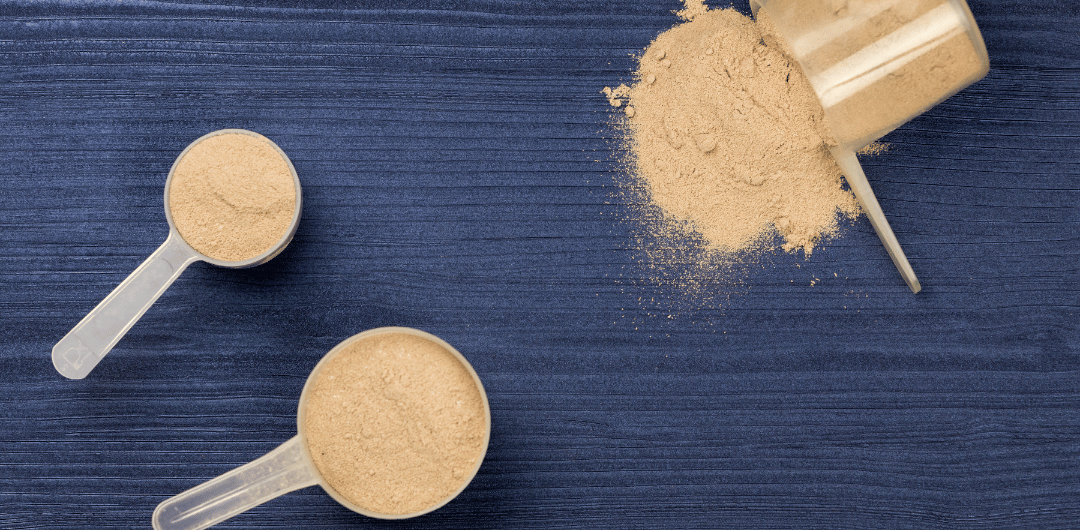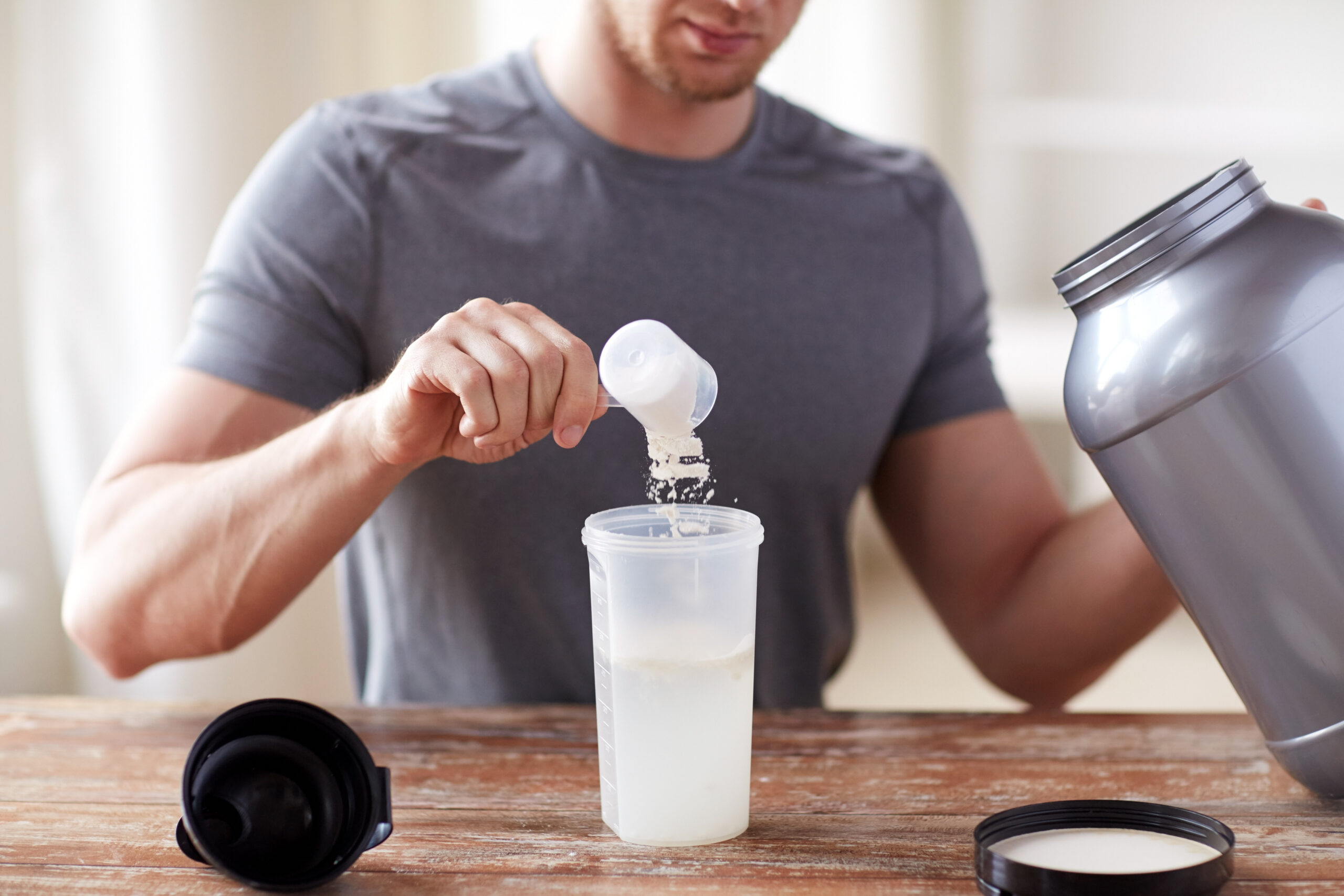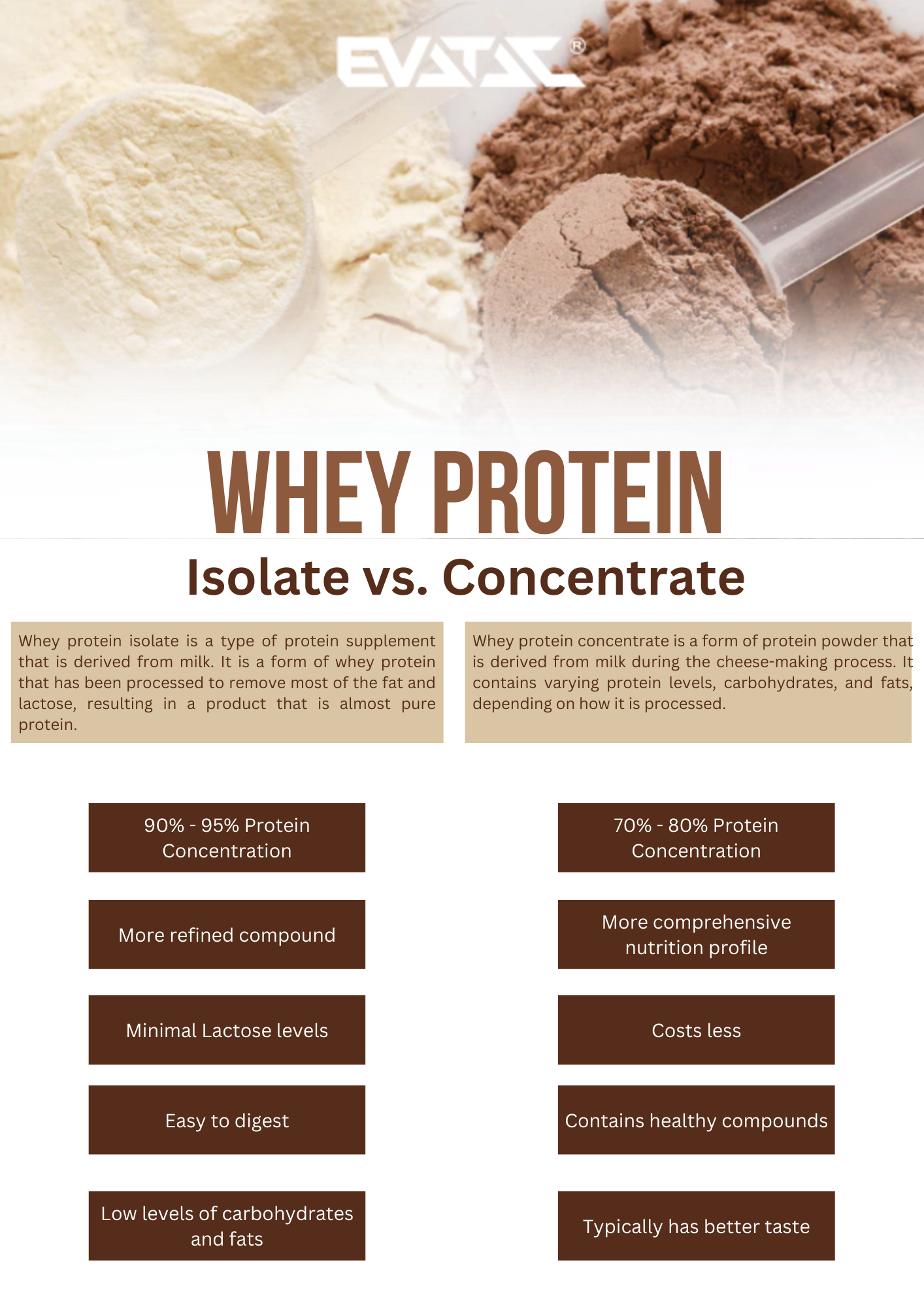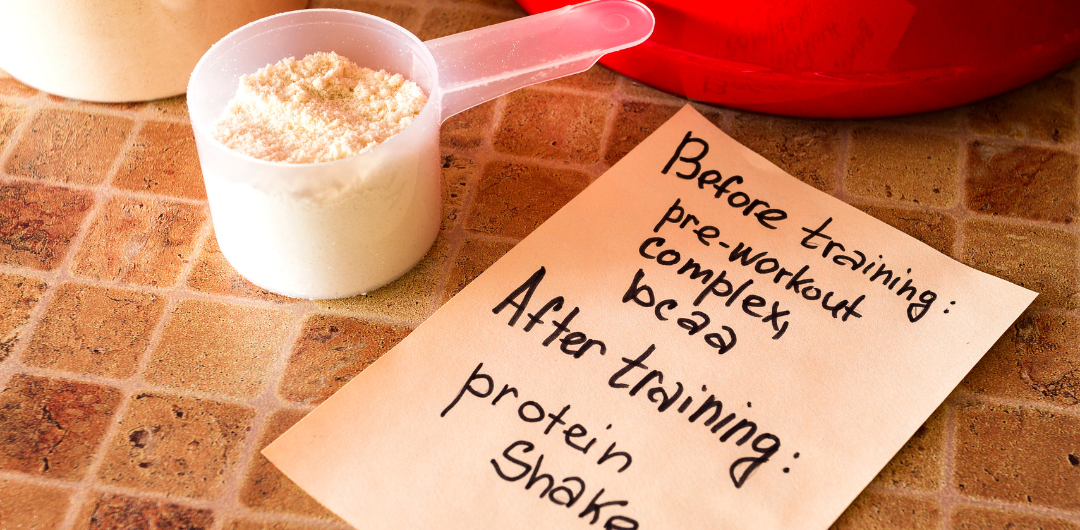
Whey Protein Isolate vs Concentrate: Which One Is Right for You?
Are you trying to build muscle or lose weight? Or you're looking for a quick and convenient way to supplement your diet with protein. Either way, whey protein is a popular choice for many fitness enthusiasts.
But with so many options available, it isn't easy to know which one to choose. Two of the most common forms of whey protein are whey isolate and concentrate.
In this blog post, we will explore the differences between these two types of whey protein, their benefits and drawbacks, and which is the best choice for your needs.
About Whey Protein

Whey protein is a type of protein that is derived from milk. It is a complete protein containing all nine essential amino acids that our body cannot produce independently. Whey protein is popular among athletes and fitness enthusiasts because it is a convenient and effective way to increase protein intake and support muscle growth.
Protein is essential for both building muscle, and repairing muscles. When we exercise, we create tiny tears in our muscle fibres, and protein is needed to repair and rebuild those fibres stronger than before. Protein also helps to support the immune system, promote satiety, and maintain healthy bones and joints.
Whey protein isolates and whey protein concentrates are two forms of whey protein. Whey protein isolate is a more refined form of whey protein processed to remove almost all fat and lactose, leaving a protein content of around 90%.
On the other hand, whey protein concentrate undergoes less processing and contains a protein content of around 70-80%, with small amounts of carbohydrate and fat content and lactose still present. Both forms of whey protein have their unique benefits and drawbacks, and choosing the right one depends on your individual needs and goals.
If you're a complete beginner or just starting out with taking whey protein, check out this ultimate beginner's guide by Healthline.
What is Whey Protein Isolate?

Whey protein isolate is a type of protein supplement that is derived from milk. It is a form of whey protein that has been processed to remove most of the fat and lactose, resulting in a product that is almost pure protein.
Whey protein isolate is typically more expensive than other forms of whey protein, such as whey protein concentrate, due to the additional processing required to create a purer product. Nevertheless, athletes and bodybuilders often use whey protein isolate to increase muscle mass and aid in muscle recovery after exercise.
How is Whey Protein Isolate Made?
Whey protein isolate is a form of whey protein processed to remove most of the fat and lactose, resulting in a protein powder typically over 90% protein by weight.
Whey protein isolate is made by separating the whey protein from the other milk components through a filtration process. This involves passing the whey through a series of filters to remove the fat, lactose, and other non-protein components, resulting in a more concentrated form of protein.
Benefits of Whey Protein Isolate
Some benefits of whey protein isolate include its high protein content, which can help support muscle growth and repair, and its fast digestion and absorption, making it a popular choice for post-workout recovery.
Nutritional Value of Whey Protein Isolate
Whey protein isolate is a complete protein source, containing all the essential amino acids the body needs to build and repair muscle tissue. It is also low in fat and carbohydrates and typically contains very little lactose, making it a good option for people with lactose intolerance.
Possible Drawbacks of Whey Protein Isolate
Possible drawbacks of whey protein isolate include a higher cost than other forms of protein and the possibility of allergic reactions or digestive issues in some individuals who are sensitive to dairy products. Additionally, some people may find the taste or texture of whey protein isolate less desirable than other protein sources.
What is Whey Protein concentrate?

Whey protein concentrate is a form of protein powder that is derived from milk during the cheese-making process. It contains varying protein levels, carbohydrates, and fats, depending on how it is processed.
Whey protein concentrate typically contains around 70-80% protein, with the remaining portion comprising carbohydrates, fats, and other nutrients. It is famous for athletes and fitness enthusiasts looking to supplement their protein intake and support muscle growth and recovery.
Whey protein concentrate is less processed and less expensive than whey protein isolate, a more pure form of whey protein.
How Whey Protein Concentrate is Made
Whey protein concentrate is produced by passing whey through a series of filters and separating the protein from the other components of liquid whey. The whey is then heated to remove any remaining liquid, and the resulting powder is spray-dried to create the final product.
Benefits of Whey Protein Concentrate
WPC is an excellent source of protein and amino acids essential for muscle growth and repair. It is also relatively affordable compared to other protein supplements, making it an accessible option for many people. Additionally, WPC contains immunoglobulins and lactoferrin, which are believed to have immune-boosting properties.
Nutritional Value of Whey Protein Concentrate
WPC typically contains 70-80% protein and varying amounts of carbohydrates, fats, and minerals. The nutritional profile can vary depending on the product and the processing methods.
Possible Drawbacks of Whey Protein Concentrate
Some people may experience digestive issues, such as bloating or gas, due to their lactose content when consuming WPC. Additionally, WPC may not be suitable for individuals with lactose intolerance or milk allergies.
Finally, the protein content of WPC can vary between brands and products, so it is essential to read labels carefully to ensure you are getting a high-quality product.
Differences Between Whey Protein Isolate and Concentrate
 Whey protein is a popular supplement among athletes, bodybuilders, and fitness enthusiasts due to its effectiveness in promoting muscle growth and recovery. However, there are different types of whey protein supplements, with whey protein isolate and concentrate is the most commonly used.
Whey protein is a popular supplement among athletes, bodybuilders, and fitness enthusiasts due to its effectiveness in promoting muscle growth and recovery. However, there are different types of whey protein supplements, with whey protein isolate and concentrate is the most commonly used.
While they share some similarities, they also have differences that can affect their effectiveness and suitability for different individuals.
This information will help you determine which whey protein supplement is right for you and your fitness goals.
Comparison of Nutritional Value
One significant difference between whey protein isolate and concentrate is their nutritional value. Whey protein isolate is a more purified form of whey protein, with a higher percentage of protein and lower amounts of fat, lactose, and other carbohydrates.
On the other hand, whey protein concentrate contains a lower percentage of protein, with higher amounts of fat, lactose, and other carbohydrates.
Comparison of Protein Content
Whey protein isolate typically has a higher protein content than whey protein concentrate. Whey protein isolate can have up to 90% protein content, while whey protein concentrate typically ranges from 30% to 80% protein content.
Comparison of Amino Acid Profile
Both whey proteins isolate and concentrate contain all essential amino acids needed for muscle growth and repair. However, whey protein isolate has a slightly higher concentration of branched-chain amino acids (BCAAs), essential for muscle recovery and growth.
Comparison of Price
Whey protein isolate is generally more expensive than whey protein concentrate due to the additional processing required to isolate the protein.
Comparison of Taste and Texture
Whey protein isolate is often considered to have a cleaner taste and smoother texture than whey protein concentrate, which may have a slightly gritty texture and slightly milky taste due to the higher lactose content.
Choosing the Right Whey Protein for You

Choosing the right whey protein supplement can be daunting, especially with so many options available in the market. However, selecting the right product is crucial for achieving optimal muscle-building and recovery results.
There are several factors to consider when choosing the right whey protein supplement, including your fitness goals, budget, dietary restrictions, and taste preferences.
Understanding Your Fitness Goals
Your fitness goals are one of the most important factors to consider when choosing the right whey protein supplement. Different goals, such as muscle building or weight loss, may require different types of whey protein with varying protein content and other ingredients.
To take your protein shakes on the go, check out the EVA Shaker Bottle.
Identifying Your Dietary Needs and Restrictions
Before choosing a whey protein supplement, you must identify any dietary needs and restrictions you may have. For example, if you are lactose intolerant or have a dairy allergy, you may need to choose a plant-based protein powder instead of a whey protein supplement.
Reading Labels and Understanding Ingredients
It is essential to read labels and understand the ingredients in a whey protein supplement before purchasing. Look for high-quality ingredients and avoid additives, fillers, and artificial sweeteners.
Consulting with a Nutritionist or Fitness Professional
If you are still determining which whey protein supplement is right for you, consulting a nutritionist or fitness professional can be helpful. They can offer personalized recommendations based on your individual needs and goals.
Trying Different Products to Determine Your Preference
Finally, trying different whey protein supplements can help you determine your preference in terms of taste, texture, and effectiveness. Feel free to experiment until you find the right product for you.
If you're looking for the right product for you, EVATAC has a list of the Top 8 Meal Replacement Shakes in Australia.
Final Thoughts
Whether you choose whey protein, isolate, or concentrate depends on your fitness goals and dietary needs. Both forms of whey protein offer benefits for muscle building and recovery but have different nutritional values, protein content, and amino acid profiles.
When choosing the suitable whey protein for you, it is essential to consider your goals and dietary restrictions and read labels and understand the ingredients. Consulting with a nutritionist or fitness professional can also help determine the best option for your needs.
Ultimately, trying different products can help you determine your preference in terms of taste and texture. With the right choice of whey protein, you can take a step towards achieving your fitness goals and optimizing your performance.







